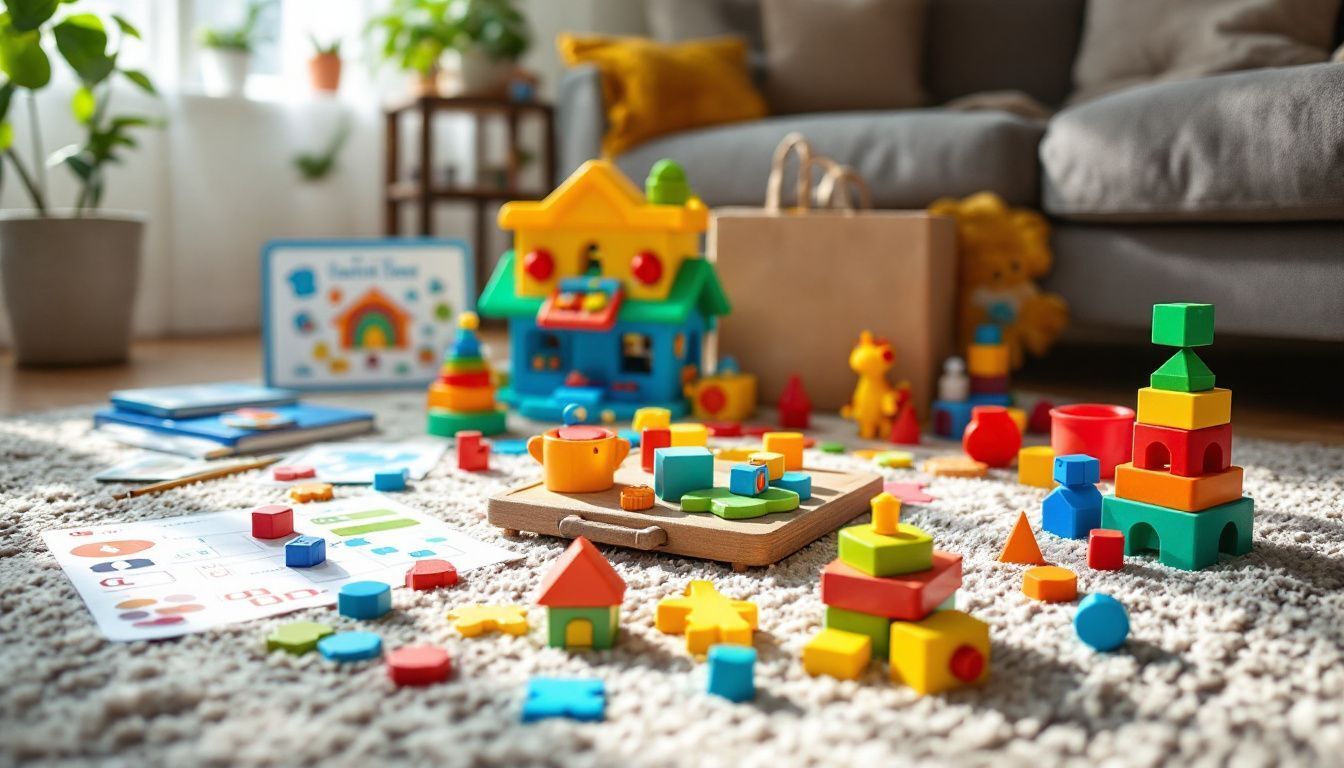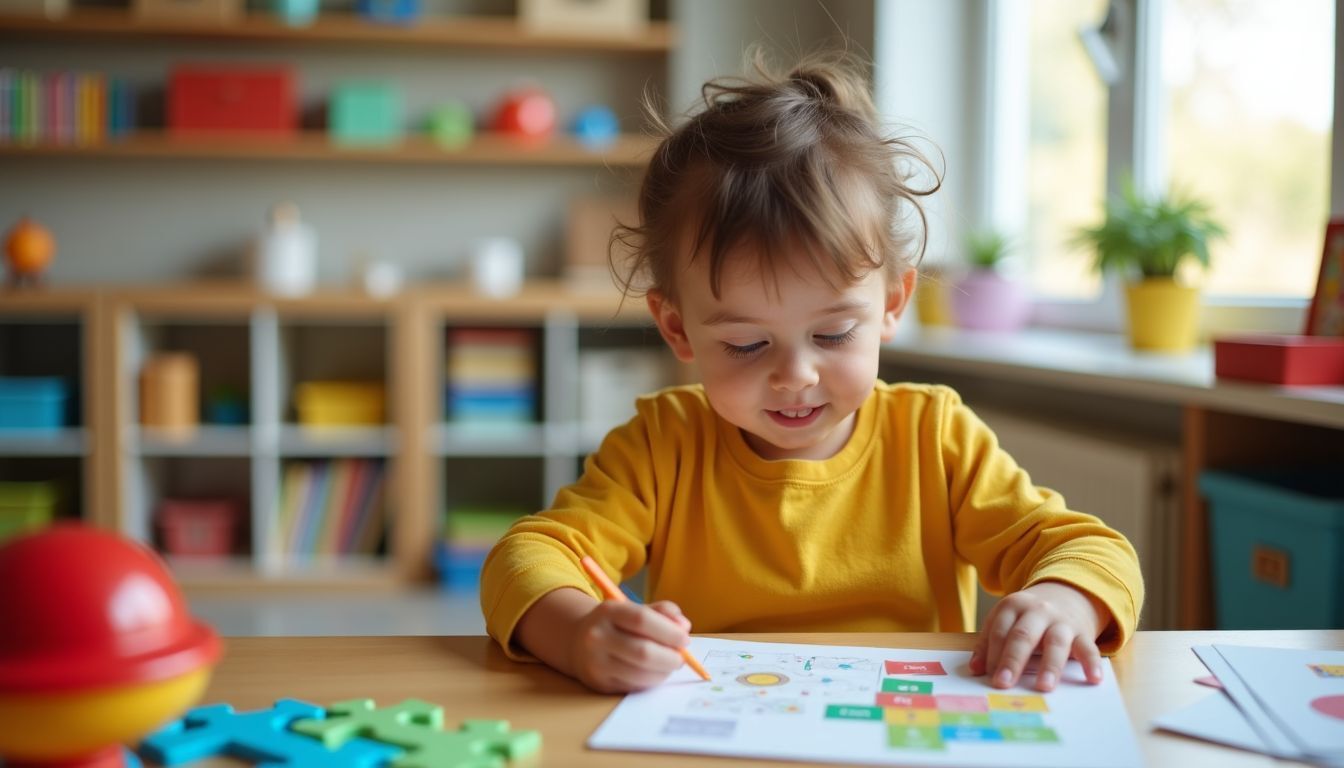
Many parents worry about supporting their child's growth during the preschool years. Children’s brains develop rapidly in the first five years. This post shares ways to boost cognitive, social, and emotional skills through play and activities.
Make these years count.
Key Takeaways
- Brain Development: 90% of the brain grows by age five. Preschool helps this growth with fun activities.
- Learning Through Play: Games and puzzles make kids think creatively and solve problems.
- Reading Together: Reading builds language skills and helps children love books.
- Social Skills: Playing with friends and following routines improve communication and confidence.
- Physical Activities: Arts, music, and outdoor play keep kids healthy and strong.
Enhancing Cognitive Skills Through Play

Preschool offers many chances for children to learn. With 90% of the brain developing by age five, learning through play boosts their cognitive development. Play-based activities help kids think creatively and solve problems.
Early childhood education uses games and puzzles to enhance critical thinking and memory.
Reading to children builds language skills and a love for reading. Hands-on activities keep them engaged and help them remember better. The preschool curriculum includes arts and crafts to develop fine-motor skills, music and movement, and simple science experiments.
These activities support overall child development and make learning fun.
https://www.youtube.com/watch?v=BKJzl8P3pR4
Social and Emotional Growth Strategies
Enhance social skills by setting routines. Routines give children stability and security. Encourage your child to interact with peers. Social interactions build communication and emotional intelligence.
Ask open-ended questions to support their learning. Promote independent play for self-regulation. Emotional support from parents builds confidence and resilience.
Emotional support builds the foundation for a confident child.
Use imaginative play to develop empathy. Siblings learn cooperation through playtime. Parenting tips from child psychologists include structured activities. Engaging in water play and group games strengthens bonds.
Help your child gain independence and emotional strength.
https://www.youtube.com/watch?v=h973WVZ9eAw
Physical Development Activities
Physical activities support a preschooler's growth and health. They build strong muscles and coordination.
Arts and Crafts
Cutting, gluing, and drawing enhance fine motor skills. Use materials from amazon.com for varied projects.
Cutting, gluing, and drawing enhance fine motor skills. Use materials from amazon.com for varied projects.
Music and Movement
Dancing and playing instruments boost physical coordination. Educational psychologists recommend daily sessions.
Dancing and playing instruments boost physical coordination. Educational psychologists recommend daily sessions.
Simple Science Experiments
Activities like pouring and mixing develop hand-eye coordination. These experiments make learning fun.
Activities like pouring and mixing develop hand-eye coordination. These experiments make learning fun.
Outdoor Play
Running, jumping, and climbing strengthen muscles. Include playground time in your daily routine.
Running, jumping, and climbing strengthen muscles. Include playground time in your daily routine.
Limit Screen Time
Use age-appropriate educational content to support physical breaks. Balance screen time with active play.
Use age-appropriate educational content to support physical breaks. Balance screen time with active play.
Physical Skill Games
Games like tag and hopscotch improve agility. Incorporate these into homeschooling schedules.
Games like tag and hopscotch improve agility. Incorporate these into homeschooling schedules.
Yoga and Stretching
Simple poses increase flexibility and balance. Teach these alongside multi-level teaching strategies.
Simple poses increase flexibility and balance. Teach these alongside multi-level teaching strategies.
Sports Activities
Introduce basic sports to develop teamwork and motor skills. Use textbooks to find age-suitable sports.
Introduce basic sports to develop teamwork and motor skills. Use textbooks to find age-suitable sports.
Next, explore strategies for social and emotional growth.https://www.youtube.com/watch?v=5udNR1PVFUU
Conclusion: Maximizing Preschool Potential
Preschool years are vital for your child’s growth. Play builds their thinking and problem-solving skills. Reading together boosts language and a love for books. Kids learn to share and communicate with friends.
Support their journey to set a strong foundation for school and beyond.
FAQs
1. How can parents enhance their child's learning in preschool?
Parents can enhance their child's learning by engaging in activities that promote curiosity, reading together, and providing a supportive environment. Use teaching experience to choose games and tasks that build essential skills.
2. What role does teaching experience play in preschool education?
Teaching experience helps educators create effective lesson plans, understand each child's needs, and foster a positive learning atmosphere. Experienced teachers can better prepare children for becoming school-aged children.
3. What activities are best for preparing children for school-aged years?
Activities like puzzles, storytelling, and interactive play support a child's learning. These tasks develop social skills and cognitive abilities, making the transition to school-aged children smoother.
4. When should parents focus on transitioning their child from preschool to school-aged programs?
Parents should start the transition by observing their child's readiness, such as attention span and social interactions. Using teaching experience, they can select programs that align with their child's learning stage.